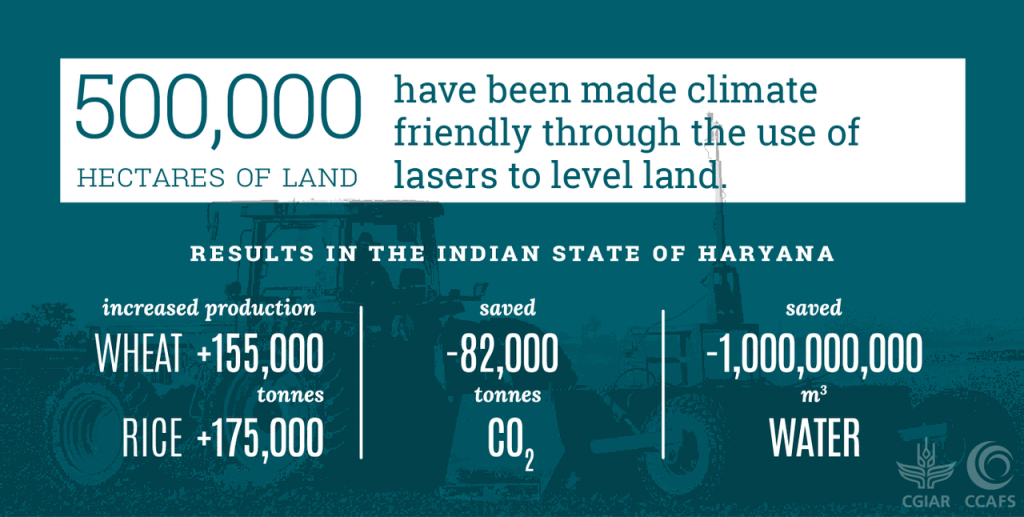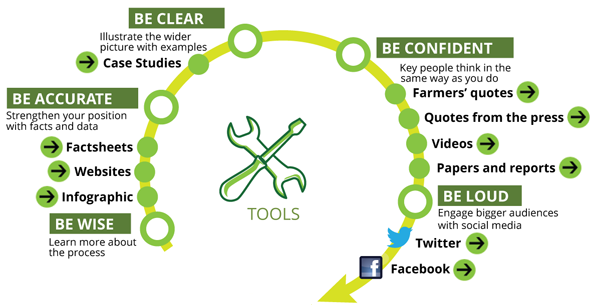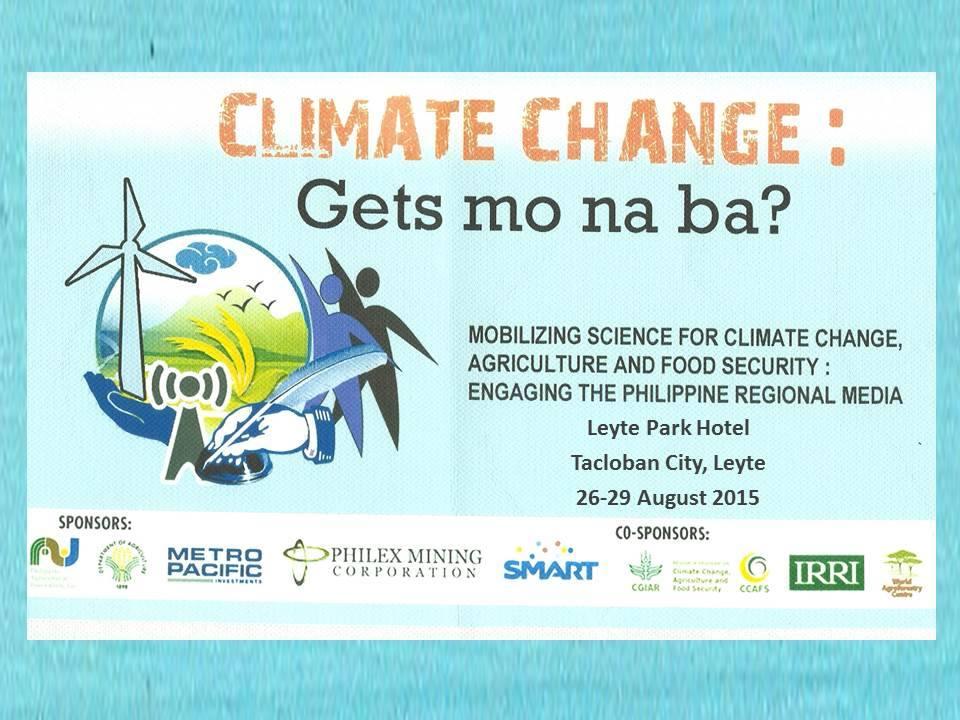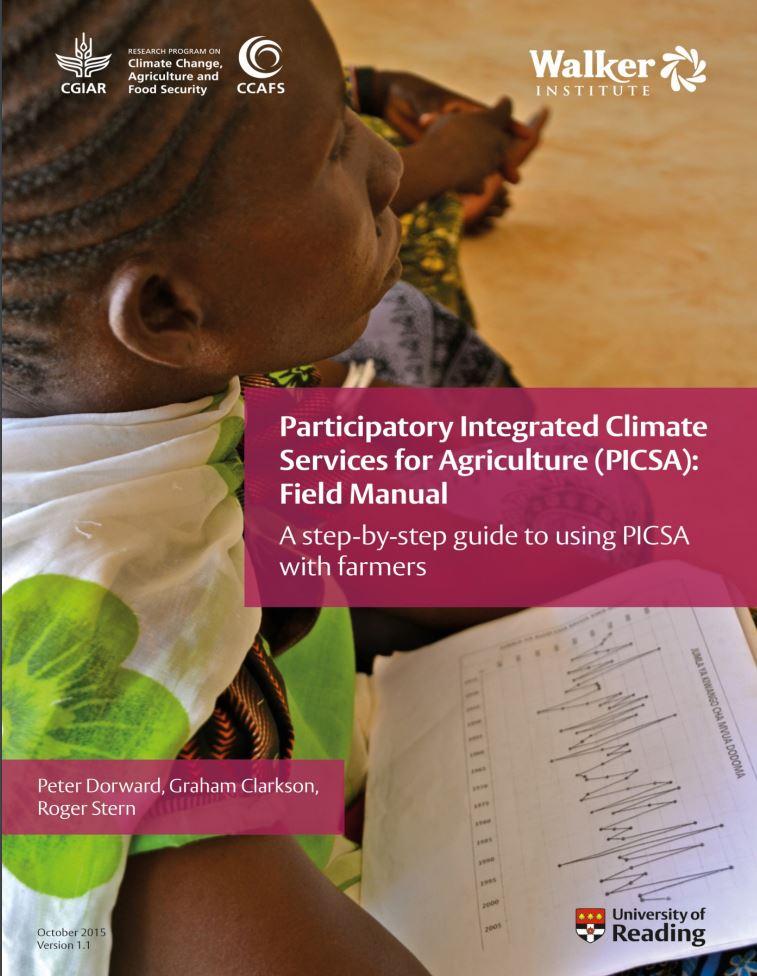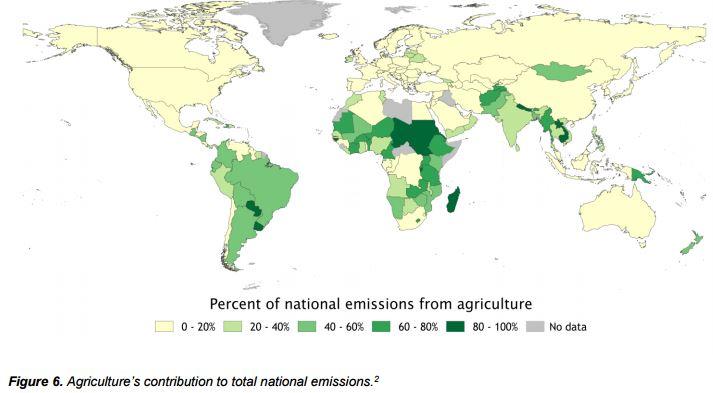2015: The year in advancing climate-smart agriculture
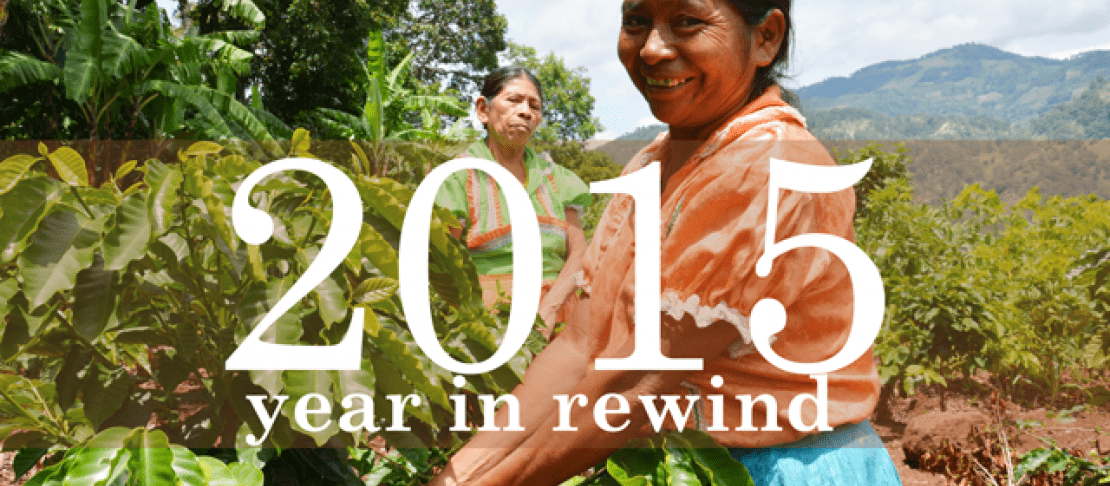
2015 was an important year for advancing climate change, agriculture and food security research. Join us to revisit the highlights!
January: insuring the future of farmers under climate change
In highly variable climates farmers are generally reluctant to invest in more profitable technologies and practices. This lack of investment, combined with climate variability leading to unpredictable yields, is a major factor in keeping farmers trapped in poverty.
Index insurance for farmers explained! Check out new #infographic from @cgiarclimate : http://t.co/zUmxJjk61S pic.twitter.com/3c6fS2OzFW
— Farming First (@farmingfirst) January 27, 2015
Insurance protects farmers from crop losses due to bad weather and encourages them to innovate. The CGIAR Research Program on Climate Change, Agriculture and Food Security (CCAFS) Flagship on Climate risk management is working with partners to develop weather index-based insurance schemes to help secure farmers’ livelihoods and enable them to invest in climate-smart technologies. Through a CCAFS-IFPRI project in India, over 1 million farmers' adaptive capacity will improve by 2025 with the help of climate-smart insurance.
over 1 million farmers' adaptive capacity will improve by 2025
In January, CCAFS organised a webcast event that focused on innovations in index insurance that can safeguard the future of farmers under climate change. The webcast was accompanied by a new report: Scaling up index insurance for smallholder farmers: Recent evidence and insights
Watch the webcast:
Read more:
- Article on Aljazeera America: Climate-linked insurance could help poor farmers offset crop failure risk
- Outcome case: Scaling up and improving insurance schemes for farmers in India and Nigeria
February: empowering young women and men in rural communities
Not all people in a community have the same needs when it comes to climate change adaptation. To design better programs, researchers need to understand the local context and needs of local target groups.
A team of researchers from the International Centre for Tropical Agriculture (CIAT), CCAFS and the CGIAR Research Program on Integrated Systems for the Humid Tropics (Humidtropics) conducted a Participatory Video (PV) workshop in Latin America to observe and examine rural livelihoods, particularly from a gender and youth perspective, to allow local populations to share their stories and voice their opinions about their community’s way of life.
In February, based on the workshops a Working Paper was published that shed light on how local community members explain climate change from their personal perspective via writing, directing and filming their short video. According to Shadi Azadegan from Humidtropics:
Aside from being more effective than brief training sessions which may not necessarily be a part of a larger plan of long-term capacity development, it will help communities strengthen their trust in their indigenous knowledge.
See more workshop photos:
Read more:
- Blog: Participatory Video: local perspectives on climate change
- Video: Participatory video: Climate change in Nicaragua
March: closing the gender gap in farming under climate change
Women are more vulnerable than men to the effects of climate change and have different adaptive capacities. They produce less, and have less access to agricultural resources and information.
CCAFS Gender and social inclusion research aims to have a positive impact on social inclusion for both men and women farmers. In March, CCAFS organized a high-level event where researchers from CGIAR and partners shared cutting-edge knowledge on research on gender, climate change, agriculture and food security.
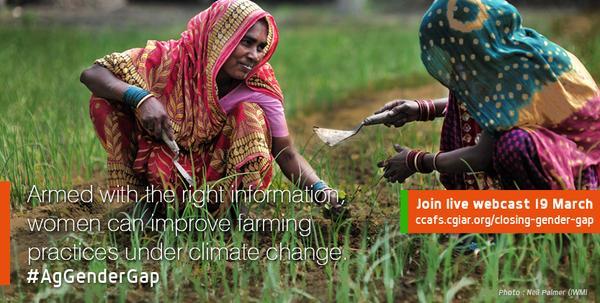
Watch recordings of all sessions:
Based on the research presented at the seminar, CCAFS, the International Social Science Council (ISSC) and Future Earth produced five key policy recommendations for supporting women farmers in a changing climate.
Read more:
- Policy Brief: Supporting women farmers in a changing climate: five policy lessons
- Blog: Outside the box: Considering diversity among women in climate vulnerability
April: promoting Climate-Smart Villages in India
Can farmers adapt their agricultural practices to secure dependable food supplies and livelihoods and at the same time decrease greenhouse gas emissions? To answer this question, CCAFS South Asia and partners are testing a range of interventions in Climate-Smart Villages.
In April, CCAFS and Practical Action Consulting (PAC) organized a workshop for Nepalese government officials, civil society groups, private firms and development organisations to discuss the relevance of the Climate-Smart Village programme in Nepal. The workshop was part of the Participatory evaluation of climate-smart village models in South Asia project which aims to bridge existing knowledge gaps and support the CCAFS Research Flagships to develop national or subnational CSA initiatives leading to at least 50,000 to 10 million beneficiaries.
Read more:
- Outcome case: Scaling up Climate-Smart Villages in India
- Blog: Haryana says 'yes' to more Climate-Smart Villages
May: acting locally, informing globally
CCAFS aims to reach 30 million farmers by 2025, 40% of whom are women to strengthen their food security
The CCAFS Flagship on Climate-smart agricultural practices aims to reach 30 million farmers by 2025, at least 40% of whom are women, to strengthen their food security and adaptive capacity. To achieve this it is necessary that public agencies and civil society organizations work together with the private sectore to promote equitable climate-smart agriculture.
In May, the newly published 2014 Annual Report concluded that "CCAFS helped advance the concept and practice of climate-smart agriculture in farmers’ fields and in global initiatives, through close collaboration with farmers, civil society, governments and researchers."
read more:
- Outcome case: Informing implementation of climate-smart agriculture at national, regional, and continental scales
- Research highlight: Laser land levelling: How it strikes all the right climate-smart chords
June: informing countries' positions on agriculture in the climate negotiations
In June, agriculture was high on the agenda at the meeting of the Subsidiary Body for Scientific and Technological Advice (SBSTA) of the UN Framework Convention on Climate Change (UNFCCC). In preparation of the workshops on agriculture, CCAFS and partners prepared two submissions focusing on how climate change will impact smallholder farmers, fisheries and pastoralists, summarized in two Info Notes:
Improving early warning systems for agricultural resilience in Africa: Extreme climate events can undermine agriculture and rural development – how can this be avoided? The info note sets out six recommendations to African policy makers for strengthening existing and developing new early warning systems that would provide an alert of a potential weather-related disruption in food production.
- Impact of climate change on African agriculture: focus on pests and diseases: Climate change impacts on agricultural systems include a likely increase of pest and disease outbreaks, affecting crops, livestock and fisheries. This creates a new threat for Africa’s food security. One of the key recommendations is to build multi-country coordination for new and adapted pest and disease management systems that are based on sound science.
In addition to the submissions, Farming First, the Technical Centre for Agricultural and Rural Cooperation (CTA) and CCAFS updated a toolkit to help farming advocates engage with agriculture within climate change negotiations.
Guide to the UNFCCC negotiations on agriculture:
read more:
- Research highlight: New briefs highlight critical agriculture issues for UN climate talks
- Article on The Huffington Post by Anette Friis: Seizing the Opportunity for Agriculture in a New Climate Change Deal
July: our common future under climate change
The Our Common Future Under Climate Change conference in Paris brought together close to 2,000 researchers with the aim to address key issues concerning climate change in the broader context of global change.
"The negative impacts of climate change on agricultural productivity and food security varies by gender and wealth affecting the vulnerable groups, especially women," state CCAFS East Africa researchers in their poster, 'Engendering climate-smart agricultural innovations in East Africa', presented at the conference. Their study finds that in Kenya, farming households adapt better to climate change impacts where women make day-to-day decisions.
As well, CCAFS and IFAD co-organized a side event on food and farming under climate change where panelists and audience members shared examples of country-led initiatives, where governments are working with farmers, the private sector and civil society to improve resilience and reduce emissions where possible.
Read more:
- Blog: Where women decide: faster adaptation, more resilience
- Article on Reuters: From second jobs to new 'stinginess', women see climate change differently
August: improving climate-related media coverage
Equipping media with scientific knowledge around various climate change issues facilitates more science-based reporting which may translate to better public understanding and informed decisions in adapting to and mitigating climate change.
CCAFS Southeast Asia has been part of an initiative that aims to improve climate-related media coverage in the region. In August, 37 journalists and 16 government officials gathered in the Philippines for a media workshop to gain scientific knowledge on climate change and to discuss possibilities of how to effectively communicate about climate change.
Workshop poster: Climate change: Do you get it now?
READ MORE:
- Blog: Laotian media professionals trained in climate change
- Blog: Tune in: Philippine rural broadcasters to promote climate-smart agriculture
September: scaling up climate services
In 2014, more than 2 million Senegalese farmers could access climate information
In Senegal, climate information is considered as an integral agricultural input just like seeds, fertilizers and other basic material production. In 2014, more than 2 million Senegalese farmers could access climate information. This figure keeps growing; today they are nearly 7 million.
In September, CCAFS West Africa organized a media training and field trip to demonstrate the success of the Senegal-based project on strengthening the scaling up of climate services, and enhance capacity for regional media to report effectively on climate change issues.
Read more:
- Outcome case: The impact of climate information services in Senegal
- Radio story on NPR: This Peanut Farmer Turns To A Cellphone — And Prayer — For A Top Crop
October: integrating climate information into farming practices
Smallholder farmers are key to food security in sub-Saharan Africa where two thirds of the population depend on small-scale, rain-fed farming as their main source of food and income. Critical farming and household decisions depend upon the weather that vary considerably from year to year.
In October, CCAFS Flagship on Policies and institutions organized an online launch of the Participatory Climate Information Services for Agriculture (PICSA) manual that aims to help farmers make informed decisions based on accurate, location specific, climate and weather information; locally relevant crop, livestock and livelihood options; and with the use of participatory tools to aid their decision making.
read more:
- Blog: New manual helps expand reach of climate services together with farmers
- Publication: Participatory Integrated Climate Services for Agriculture (PICSA) Manual
November: identifying distribution of emissions among countries
CCAFS Flagship 3 aims to achieve a 15% reduction of GHG emissions intensities by 2025
Low emissions agriculture must improve farmers' livelihoods and reduce emissions. CCAFS research provides farmers, technical advisors and national policy-makers with science-based evidence and recommendations about low emissions agriculture practices such as improved feed for livestock, more efficient use of nitrogen fertilizers, agroforestry, and water management in paddy rice, and the practices' suitability for different environments and types of farmers. CCAFS Flagship on Low emissions agriculture aims to achieve a 15% reduction of GHG emissions intensities by 2025, relative to 2015, while enhancing food security, in at least eight countries in Africa, Asia and Latin America.
In November, CCAFS published an Info Note on agricultural emissions from different countries.
Read more:
- Info Note: Agriculture's contribution to national emissions. Analysis of national reports to the UN Framework Convention on Climate Change
- Outcome case: Scaling up climate-smart dairy practices in Kenya through Nationally Appropriate Mitigation Actions
December: moving towards a new climate agreement
At this year's climate change conference, CCAFS and partners were working to ensure that a new climate deal does not close the door on agriculture. CCAFS participated in the launch of the 4 per 1000 initiative that aims to ensure that agriculture plays its part in combating climate change. On Farmers Day, we co-organized a session on climate-smart agriculture in Africa.
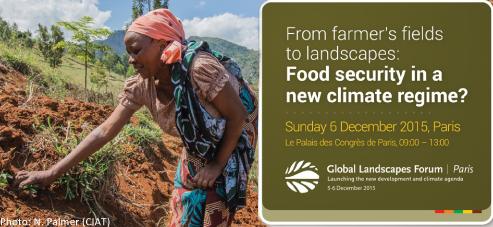
At the Global Landscapes Forum (GLF), CCAFS co-hosted a side event on ensuring food security under climate change through policies, integrated land use, new technologies and practices, and empowering women and youth.
In addition to the side events, CCAFS and CGIAR presented a video about the importance of agricultural development for our future.
Watch the video:
After two weeks of negotiations, COP21 opened the door for more adaptation and mitigation in the agriculture sector. The new CCAFS Info Note: The Paris Climate Agreement: what it means for food and farming concludes that the collective outcomes of COP21 offer many opportunities for action on food and farming – to be seized by the global agriculture community.
Read more:
- Article on The Huffington Post by Bruce Campbell: Climate Change: Half a Degree Will Make a World of Difference for the Food We Eat
- Research highlight: Paris Climate Agreement unlocks opportunities for food and farming
What will 2016 bring?
We already have plenty of plans for next year, such as bringing agriculture into key UNFCCC forums, supporting countries in preparation of the next round of INDCs and engaging partners to make significant measurable investments in climate-smart agriculture. CCAFS looks forward to continued collaboration with partners, and exciting innovations in the coming year.
If you want to keep up to date about our activities, sign up for our newsletters, read our blog and follow us on Twitter, Facebook and LinkedIn.
Lili Szilagyi is a Communications Student Assistant at the CCAFS Coordinating Unit.

